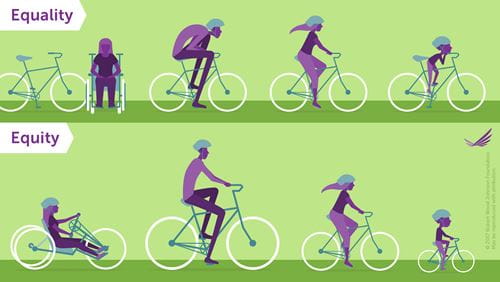Health equity means that everyone has a fair and just opportunity to be as healthy as possible. This requires removing obstacles to opportunity, such as poverty, discrimination, and their consequences. Achieving equity also requires addressing the social determinants of health to better ensure access to good jobs with fair pay, quality education, housing, safe environments, and health care. Being as healthy as possible refers to the highest level of health that reasonably could be within an individual’s reach if society made adequate efforts to provide opportunities.1
Racial equity is the condition that would be achieved if one's racial identity no longer predicted, in a statistical sense, how one fares. When we use the term, we are thinking about racial equity as one part of racial justice, and thus we also include work to address root causes of inequities not just their manifestation. This includes elimination of policies, practices, attitudes and cultural messages that reinforce differential outcomes by race or fail to eliminate them.2
1. Racial Equity: GARE Racial Equity Toolkit - https://www.racialequityalliance.org/wp- content/uploads/2015/10/GARE-Racial_Equity_Toolkit.pdf.
2. Pat, M. A. L. A. B. (1997). Teaching for Diversity and Social Justice: A Sourcebook. Psychology Press.

Why is it important for public health to focus on and eliminate health and racial inequities?
At the PHIDH, we believe that racism is a public health emergency. We actively plan strategies to address health and racial disparities in our community and all across our programs. We have a Racial Equity Committee that oversees our action plan.
- Our mission is to enhance health and promote equity with our communities. We use a community engagement framework to ensure we co-create programs and services with our community.
- Our vision is:
- Health and racial equity are realized.
- Communities most impacted by health inequities are leading change efforts.
- Public Health is a supported and trusted partner.
What does Health and Racial Equity look like at the Public Health Institute at Denver Health (PHIDH)?
- Strengthening staff capability and organization capacity to advance health equity in Denver.
- Recognizing, acknowledging and working to end historical and current inequities.
- Providing training and targeted support so all staff understands the importance of health equity and how it impacts their work.
- Integrating health and racial equity into our services and programs to support the vision of the Public Health Institute at Denver Health.
- Collaborating with Denver communities to understand address their health needs.
- Following our Data Equity Principles.
Health Equity Action Plan
The Public Health Institute at Denver Health’s health equity action plan utilizes a racial equity framework as the foundation that embeds racial equity in our effort to achieve health equity via the four strategies outlined below.
- Equitable and Actionable Data
Support a culture of data that collects, monitors, analyzes, and shares data on health outcomes and behaviors to assess disparities to advance health equity. - Community Engagement
Cultivate and invest in partnerships with impacted communities to develop shared power in public health. - Organizational Readiness and Capacity
Create and implement processes and opportunities to develop a diverse workforce that supports and promotes health equity. - Policy and Systems Change
Become a community thought partner on institutional policies that impact health equity.


